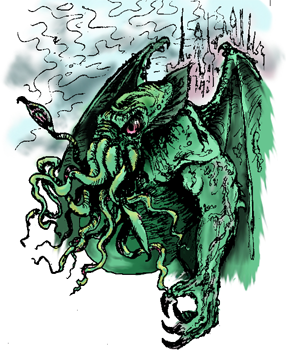Cthulhu fhtagn, Part II
As mentioned in yesterday’s post, I’ve been playing around with the Cthulhu invocation from H.P. Lovecraft:
Ph’nglui mglw’nafh Cthulhu R’lyeh wgah’nagl fhtagn.
“In his house at R’leyh, dead Cthulhu waits dreaming.”
Here is my personal interpretation of that phrase:
- Looking at Lovecraft’s translation, it appears to me that the sentence should be read “backwards” as in Fhtagn wgah’nagl R’lyeh, Cthulhu mglw’nafh ph’nglui. Stick a comma between R’lyeh and Cthulhu for good measure.
- fhtagn then becomes a participial construction meaning something like “waiting; lying in wait (as a predator)”
- wgah’nagl becomes “in (his) house/abode”
- R’lyeh, the proper name of the sunken city, modifies wgah’nagl, making the phrase R’lyeh wgah’nagl fhtagn something like “Waiting in his R’lyeh abode”
- Cthulhu is, of course, Cthulhu, the agent of the sentence.
- Sticking to my idea of modifiers coming after their words, mglw’nafh should mean “dead”. But Cthulhu cannot actually die (at least in the human sense). Therefore, I’m making mglw’nafh mean something like “potentially active, physically inactive, dormant bodily manifestation”.
- ph’nglui on the other hand is translated by Lovecraft as “dreaming”. But we know that Cthulhu can influence humans with his mind. ph’nglui I am translating then as “active mental state” in contrast to mglw’nafh, “a dormant physical state”, but the word in some verbal state.
- Furthermore, take the words ph’nglui and wgah’nagl. Note the same consonant root in both nglui and nagl (n-g-l). Using this similarity, I’m saying that nagl refers to something “inside or within”, and nglui is an “interior mental state”. By this reasoning then, wgah’ should mean “house, abode”.
Using this reasoning then, we get:
| Ph’nglui | mglw’nafh | Cthulhu | R’lyeh | wgah’nagl | fhtagn. |
| “dreaming” active mental state (verb) | “dead” dormant physical state (participle) | (agent) | (proper name) | “in (his) abode” | waiting (participle) |
Comments?
Cthulhu fhtagn!

Cthulhu, as envisioned by the Conlanging Librarian
I don’t know how I did it, but I’ve gone several decades without reading the work of H.P. Lovecraft. Don’t ask me how or why, but I just recently “discovered” his writings and now I’m hooked…especially his stories of the Elder Gods, Great Cthulhu, the Great Race of Yith, Yog-Sothoth and his kids Wilbur and the “horror”, etc. Very cool stuff!
“But why bring him up in a conlanging blog” you may ask. The only “extensive” piece of conlanging (used in the broadest possible sense) by Lovecraft is the invocation of Cthulhu: Ph’nglui mglw’nafh Cthulhu R’lyeh wgah’nagl fhtagn which Lovecraft translated in “The Call of Cthulhu” as In his house at R’lyeh dead Cthulhu waits dreaming. There are also snippets of this language in “The Dunwich Horror” and other stories. I’m not saying that Lovecraft was a conlanger. Far from it. These phrases were purposefully put together to appear as alien and unhuman as possible. Lovecraft also talks about the Great Race of Yith’s language as a “consisting of a kind of clicking and scraping” of their “huge nippers” (“The Shadow out of Time”).
It strikes me that Lovecraft is a huge untapped inspirational field for conlangers. In searching the Internet, I did find one site with a sizable dictionary and some grammar here. Even with this work, who’s to say this is the “right” one. I’ve been toying with the Cthulhu invocation and some other snippets and having an enjoyable time trying to puzzle out some sensible syntax.
Lovecraft’s prose provides tantalizing glimpses and interesting snippets from which to formulate some naming languages or simple dialogue. If you’re a conlanger looking for a fertile field to toil in…jump right in…if you dare. Cthulhu fhtagn!!
New Book Added to Sci-Fi
I came across a new “old” book recently and have added it’s Google Books page to the Sci-Fi section of TCL. The book is by Frederick Spencer Oliver and was published originally in 1894. The Atlantean or Poseid language is featured in it. For more details:
Frederick Spencer Oliver
A Dweller on Two Planets or, The Dividing of the Way
[Atlantean or Poseid language]
This novel, first published in 1894, purports to be the biography of the author’s past live as an Atlantean names Phylos.
Tarzan and His “Languages”
This article highlights a new exhibit on Tarzan in the Musée du Quai Branly, the museum near the base of the Eiffel Tower. Our conlang connection comes in with this paragraph:
Tarzan’s first spoken language, in the original novel of 1912, was ape-speak – long before scientists discovered that apes do have a language. The exhibition’s catalogue contains a fascinating linguistic study of the words used by Tarzan’s adoptive ape clan, “the Waziris”. They have 250 words, including several verbs, which are used only in the infinitive, rather like George Orwell’s Newspeak. It is worth noting that Tarzan’s second spoken language in the original novel was French, learned from a French officer rescued from cannibals.
This link gives a nice summary of the languages in Edgar Rice Burrough’s Tarzan series. Here is a nice online glossary of Mangani, the language of the apes.
Yel dan-do, yo!
UPDATE: National Public Radio did a news story on the Tarzan exhibit on Aug. 11, 2009.